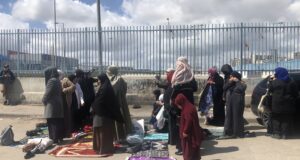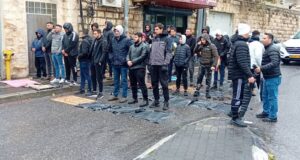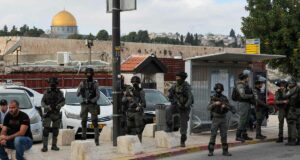At approximately 4AM on Monday July 28th, Israeli soldiers and police raided a Palestinian owned apartment block in the district of Beit Hanine in East Jerusalem.
After violently evicting the families and international human rights workers present inside, the building was blown up later the same day. According to international law, house demolition is regarded as collective punishment, which is a war crime.
About 50 Palestinians from the neighbourhood and 18 international human rights workers had joined the five families living in the building in an attempt to prevent the demolition. The Palestinians chanted “Allah akbar!” in an attempt to simulate a much larger number of people in the building. The ruse failed as an estimated 150-200 armed and masked soldiers and police stormed in with police dogs, sound bombs and tear gas.
They dragged women and children out of their homes, kicking and pushing while people tried to avoid the chaos the many soldiers caused in the narrow road that led to the building. Protestors had attempted to block this road with cars and large containers, now the frightened people were dragged over the road blocks as they fled from the building.
The entire eviction lasted less than a quarter of an hour, but the soldiers and police kept beating and kicking the human rights workers (who made no attempt to fight back) and families in the streets for several hours after the building was emptied. An elderly man was seriously hurt and had to be hospitalised.
The building was demolished because the owner had built a fifth floor onto the existing structure, without a permit. He offered to demolish the fifth floor in order to save the other four apartments, but the proposal was rejected by an Israeli court.
The huge scale of the operation, and the disproportionate nature of the punishment led people in the street to speculate about possible explanations. A Palestinian man who had joined the attempt to save the building told international human rights workers that he believed there was another reason. He said that the owner had a good reputation within the local community due to his social awareness and generosity; many local people had benefitted from this.
 International Solidarity Movement Nonviolence. Justice. Freedom.
International Solidarity Movement Nonviolence. Justice. Freedom.


